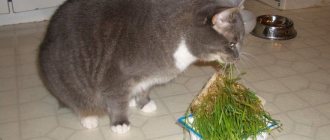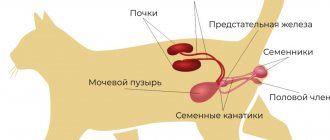Should I give my cat boiled or raw meat*? This is one of the most important issues when creating a so-called “natural” diet for your pet. And both options have their pros and cons, which we will discuss in this article.
Can cats eat raw meat?
The answer is clear: it is possible and necessary. It is obvious that for domestic cats living on the street, like their wild counterparts, no one prepares food for them; they consume rodents, mice and birds raw. At the same time, unlike many predators, they eat them immediately and mostly whole, without leaving the prey to decompose for more efficient absorption.
The cat's gastrointestinal tract is naturally designed to consume raw meat. The high acidity of gastric juice allows you to destroy pathogens contained in the carcass and dissolve raw bones. And the enzymes produced by the pancreas and other digestive organs, like the bacteria in the cat’s intestines, are adapted for the digestion of raw meat.
However, owners should understand that there is still a difference between a domestic cat living indoors and a wild or outdoor cat. So the acidity of the stomach, the composition and amount of bacteria and enzymes, directly depends on what the animal eats. If a cat has been eating industrial food for a long time, then it will be difficult for its body to digest raw meat and destroy the pathogenic organisms in it, many of which are dangerous not only for the cat, but also for humans.
Of course, a cat can be gradually transferred to raw meat, but such a transfer is not always necessary. You should not experiment if the cat is younger than 6 months/over 7 years old or if it has chronic diseases, especially those related to digestion. Most importantly, remember that the perfect is the enemy of the good. Does your cat thrive without raw meat? So there is no need to change anything.
Types of “safe” meat for cats
More than 80% of a cat's daily diet is meat. But, before feeding your mustachioed pet this product, you need to figure out which types of meat will be beneficial for the cat’s health and which types of this product can cause serious harm to the body.
First of all, you should focus on the following rules:
- the meat must be fresh;
- low-fat;
- without small and dangerous bones;
- no unpleasant odor.
You need to feed your cat high-quality meat, and not waste product that is not useful on the human table. From time to time, your pet can be pampered with offal and cartilage, always fresh and low-fat (no more than 200g per week).
To feed your cat, you can buy chicken, quail, lean lamb, beef, rabbit, turkey, horse, goat and beef.
Pork, duck, goose and fatty lamb are prohibited.
Now let's figure out in what form meat can be served to a domestic cat.
Grilled meat
Fried product is strictly prohibited for feeding domestic cats. After eating such meat, the animal may experience serious problems with the liver, stomach and other organs of the digestive tract. All this will lead to a lot of unpleasant health problems for the pet and will significantly shorten its lifespan.
Cooked meat
This meat can be given to a cat. It contains many nutrients that are beneficial for her body. The main thing is to cook the meat correctly: boil it in low-fat broth without salt and other spices.
And one more rule: you cannot give raw and cooked meat at the same time. To digest these foods, the body will need to produce different enzymes, which will negatively affect the digestion process. This may manifest itself as vomiting, stool disturbances and other unfavorable symptoms.
Choosing food: where to start
The first step is a consultation with your veterinarian. The specialist will take tests, examine the animal and create a suitable diet. This also applies to situations when a cat refuses to eat its usual food - only a doctor can determine the reason and select a new food.
Even if it is not possible to show the animal to a doctor, you can go for a consultation yourself, ask for advice in an online chat on the clinic’s website or a veterinary forum. Also, some pet stores have a veterinarian's office where you can talk to a specialist.
What to consider when choosing food:
- age of the animal - kittens need more high-calorie food, and aging cats need more fiber;
- individual needs - free-range animal, overweight, pregnancy;
- pathologies - for example, with urolithiasis and kidney failure, dietary food is needed.
Manufacturers suggest taking into account the breed of the cat. But, according to veterinarians, the anatomy and physiology of the animal are important. For example, Maine Coons need fatty acids to prevent joint diseases, but special food for them is also suitable for other large cats. And food for Persian cats with a high fiber content can be given to long-haired animals with a similar facial structure.
The main danger when choosing nutrition without consulting a doctor is an unbalanced diet. For example, animals that eat only meat may have low calcium levels. This leads to problems with the musculoskeletal system, lethargy, obesity and constipation.
The clinic periodically receives kittens with fractures due to juvenile hyperparathyroidism, a disease that occurs against the background of an unbalanced diet. This is the result of owners giving the cat only meat or low quality food. Meat is low in calcium and high in phosphorus: their ratio in beef is 1:10, in liver and heart - 1:50. And in a balanced cat diet, the ratio of calcium to phosphorus should be approximately 1:1.
Mixed nutrition
There are three types of diet for domestic cats:
- natural nutrition from ordinary products familiar to humans;
- feeding with ready-made industrial feed created for animals;
- mixed diet, which involves feeding cats natural products in combination with ready-made food.
Natural food and raw meat
When feeding natural food, the issue with raw meat is resolved on its own. This product is included in the pet menu. It can be served in processed form. To get a more nutritious meal, veterinarians recommend combining meat pieces with other healthy foods.
Dry, wet food and raw meat
Is it necessary to feed a cat raw meat if it regularly eats ready-made industrial food?
What pathologies does raw meat contain?
The biggest risk to a cat from raw meat is the possibility of helminth infection. These parasites not only significantly worsen the general condition of the animal, but can also cause death.
To protect your cat from such risks, properly prepare fresh meat for feeding your pet! Buy this product only from trusted places, carefully checking it for freshness.
Be sure to freeze the meat before serving and heat treat it. For preventative purposes, periodically give your pet anti-helminth medications. An experienced veterinarian will tell you which drug is best to choose.
Meat for castrated and sterilized
As you know, it is very important for cats after sterilization and cats after castration to choose the right diet for feeding. After such operations, great changes occur in the animal’s body, metabolic processes slow down. With improper feeding, there is a high probability of developing certain diseases that significantly worsen the general condition of domestic cats.
After sterilization, cats can be given lean meat, but only in raw and frozen form! The boiled product is not particularly beneficial for the body of operated animals. In addition, boiled meat can provoke protein intoxication, a very dangerous condition for cats.
Portions must be dosed and served fresh. You can also add some types of offal in small quantities to the menu.
After castration, cats can also eat raw lean meat after preliminary freezing. Fractional meals in small portions are encouraged, up to 5-6 times a day.
The cat should not be given a supplement, even if he really asks for it. The restless appetite of a castrated animal often leads to obesity, as a result of which the cat develops other unpleasant health problems.
What to do?
If you want to feed your cat chicken, go ahead! But in our realities, it is better to feed her boiled chicken so that she does not become infected with salmonellosis or any other dangerous bacteria. When cooking, some vitamins, of course, will be destroyed, but the cat will be able to replenish them with other food (that is, the cat cannot be fed only chicken - its diet should be as varied as possible ).
Remember that salmonella in meat dies in 10 minutes at a temperature of 75 degrees . That is, cook the chicken, chicken hearts and chicken livers longer, and don’t just scald them with boiling water.
What will a cat choose: boiled or raw chicken?
Is it possible to give raw meat to small kittens?
It is possible and even necessary to feed a small kitten raw meat! This product is especially useful not only for the body of a maturing predator, but also for its milk teeth. The first meat food can be introduced into the cat’s diet starting from 2 months of life.
For greater benefit, it is recommended to give the meat to the kitten with a bone, in the process of gnawing which, beneficial massaging of the gums and teeth occurs. Such prevention reduces the likelihood of developing tartar in animals.
The bones should not be small in size. It is unacceptable to give your kitten chicken and fish bones. They are dangerous for animals, as they can injure the esophagus and other organs of the digestive tract.
Also, you should not give your cat boiled bones, which are softer in structure. This product can also cause gastrointestinal problems.
What kind of meat can you feed a kitten? Fresh, low-fat and processed! This product is best served in small pieces. To complete your diet, mix meat with healthy cereals and vegetable purees.
How often to feed meat, and in what quantity?
Meat is the most important product in the diet of a domestic carnivore. It must be given to the cat every day. According to generally accepted standards, 80-90% of a pet’s daily diet is meat.
The amount of product to feed is calculated individually, depending on the age of the cat and its activity.
On average, kittens need 30g of meat per day, adults – about 100g. If the cat is overly active and spends a lot of time playing outdoor games, you can slightly increase the dosage of this product.
But, in order not to harm your pet’s health, we still recommend that you first consult with a veterinarian, who can accurately determine the norm for feeding your cat with meat products, taking into account its age, weight and activity level.
And remember, proper feeding is the key to a long and happy life for a domestic cat in your friendly family!
How to give: the best recipes
Cat owners recommend preparing the following simple chicken dishes for natural-fed pets:
- Chicken with vegetables. The breast is boiled and chopped. Add steamed broccoli and carrots in equal proportions. Then a small amount of fresh broth is introduced.
- Liver with garnish. Finely boil and chop 400 g of offal with the addition of 2 tbsp. l. olive or sunflower oil. Add 200 g of steamed oatmeal and 50 g of steamed green peas.
- Kidneys in sauce. Boil and chop 200 g of chicken kidneys. Add 4 tbsp. l. prepared oatmeal and ¼ cup grated carrots. Melted butter of medium fat content - 30 g is poured on top. Then 70 ml of yogurt without additives is added.
- Nutritious breakfast. Boil 70 g of rice. It is better to use unrefined, as it improves intestinal motility. Combine 1 boiled chicken egg in one plate, 1 tbsp. l. chopped carrots and boiled green beans and 20 g of chopped chicken fillet. 3 tsp is introduced. olive fruit oils.
If your cat previously ate exclusively dry food, raw chicken may not be of interest to her. Veterinarians advise boiling it and adding treats that your pet loves.
For babies and older cats, veterinarians recommend placing cooked food in a blender to simplify digestion and prevent constipation. It is not enough for cats to eat meat in its pure form; the menu must be supplemented with sources of carbohydrates and fiber - bran, vegetables or fruits.











